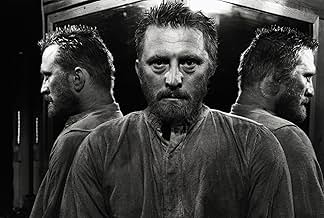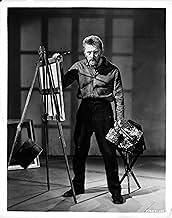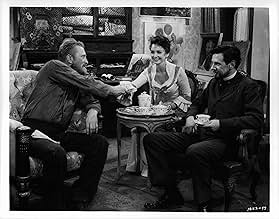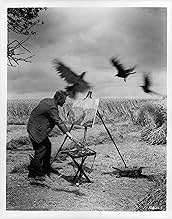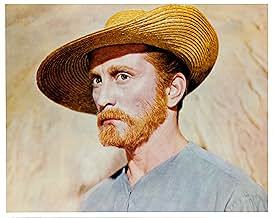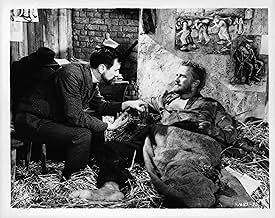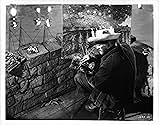IMDb-BEWERTUNG
7,3/10
12.900
IHRE BEWERTUNG
Das Leben des brillanten, aber gequälten Künstlers Vincent van Gogh.Das Leben des brillanten, aber gequälten Künstlers Vincent van Gogh.Das Leben des brillanten, aber gequälten Künstlers Vincent van Gogh.
- Regie
- Drehbuch
- Hauptbesetzung
- 1 Oscar gewonnen
- 4 Gewinne & 6 Nominierungen insgesamt
Empfohlene Bewertungen
Although I started my academic career as an art major, my interest was always in making art of my own rather than studying the works of the past masters. As a result, I wouldn't know a Manet from a Monet, but one painter whose work I can always identify is Vincent Van Gogh, perhaps the most famous example of the "tortured artist" who sought solace from the pain of life through his work. Like so many artists from different mediums, Van Gogh's life, especially the dramatic episode in which he sliced off his ear in an epileptic fit, is more famous than his work, a situation heightened, no doubt, by Don Mclean's melancholy ballad "Vincent," an improbable chart topper in 1972. Prior to being honored by the composer of "American Pie," Van Gogh's biggest brush with popular success came with Vincent Minnelli's film of Irving Stone's best-seller, an often melodramatic but still effective dramatization of the artist's troubled life. Kirk Douglas' intense portrayal of the impoverished and often fanatical Dutchman is helped immeasurably by his physical resemblance to his subject. Bearded, and with his blonde hair dyed red, Douglas could easily be mistaken for the man whose self-portraits hang on the wall of the modest bedroom where much of the film takes place. Occasionally, Douglas' clenched teeth and fist approach to drama comes through to reveal the actor behind the makeup, but his Oscar nominated performance seldom falls victim to the actor's "star" persona. Even Anthony Quinn, an actor who has given the same performance in dozens of movies, is good, but his brief turn as Paul Gaughan is hardly distinguished enough to merit the Oscar for best supporting actor. The rest of the cast is beautifully assembled with James Donald properly sympathetic as Vincent's patient, supportive brother, Theo, and no way can I complain about any film that finds room for the splendid presence of Henry Daniell, seen here as the patriarch of the Van Gogh family. The paintings, a wild riot of colorful intensity, are seen throughout (courtesy of numerous private collectors and public museums, including my hometown's Cleveland Museum of Art), and without them, "Lust for Life" would have a lot less luster.
Not only does KIRK DOUGLAS bear a remarkable resemblance to the real Vincent Van Gogh, but he gives a deeply felt, bigger than life performance in the role of a lifetime, fully deserving his Academy Award nomination.
The letterbox version on TCM doesn't do justice to the film's brilliant color photography, deliberately muted for the early coal mining scenes but crisp and clear when it comes to Van Gogh's now famous paintings. I haven't seen the DVD version, but I hope it's considerably better than the print showing on cable.
At any rate, it's tremendously well done--the entire look of the production creating the sense of time and authentic atmosphere and actually filmed on the actual location sites with an impressive cast of villagers and supporting actors. PAMELA BROWN, NIALL MacGINNIS (as The Postman), and most of all, JAMES DONALD as brother Theo, who nurtures his brother and supports him financially but is unable to sell any of his paintings--except one.
It's a fine recreation of the Irving Stone novel and Douglas immerses himself in the character of Van Gogh, much the way ANTHONY QUINN does as Gauguin. Quinn's stormy, tempestuous relationship with Douglas provides some electric moments of conflict.
The score by Miklos Rozsa accents the drama at every turn, slashing at the drama the way Van Gogh slashed at his canvas with thick brush strokes. It's starkly dramatic without ever being overbearing.
Vincent Minnelli's direction is above reproach. A finer tribute to the tormented artist could not be imagined with so many of his canvases shown on screen in impressive close-ups.
The letterbox version on TCM doesn't do justice to the film's brilliant color photography, deliberately muted for the early coal mining scenes but crisp and clear when it comes to Van Gogh's now famous paintings. I haven't seen the DVD version, but I hope it's considerably better than the print showing on cable.
At any rate, it's tremendously well done--the entire look of the production creating the sense of time and authentic atmosphere and actually filmed on the actual location sites with an impressive cast of villagers and supporting actors. PAMELA BROWN, NIALL MacGINNIS (as The Postman), and most of all, JAMES DONALD as brother Theo, who nurtures his brother and supports him financially but is unable to sell any of his paintings--except one.
It's a fine recreation of the Irving Stone novel and Douglas immerses himself in the character of Van Gogh, much the way ANTHONY QUINN does as Gauguin. Quinn's stormy, tempestuous relationship with Douglas provides some electric moments of conflict.
The score by Miklos Rozsa accents the drama at every turn, slashing at the drama the way Van Gogh slashed at his canvas with thick brush strokes. It's starkly dramatic without ever being overbearing.
Vincent Minnelli's direction is above reproach. A finer tribute to the tormented artist could not be imagined with so many of his canvases shown on screen in impressive close-ups.
Kirk Douglas is Vincent Van Gogh in "Lust for Life," directed by Vincent Minnelli and also starring Anthony Quinn as Gaugin (Oscar winner for his performance), and James Donal as Van Gogh's brother Theo.
This film is actually based on the Irving Stone novel and while it leaves out parts of Van Gogh's life, it does seem to hit the high points. A sensitive man with a spiritual sense of life, Van Gogh seeks from the beginning to express God in some way and to give something to the world. He is unsuccessful as a minister and eventually takes up painting, supported by his loving brother Theo. Basically he lives somewhere until whomever he's living with gets sick of him and throws him out. He is a terribly lonely man, but he has an intensity that is almost frightening to people. At one point, he takes up with a sometime prostitute with a baby - she eventually leaves. In actual fact, when Van Gogh met this woman, named Sien, she was pregnant with a second child, who grew up believing Van Gogh was his father. Sien some 20+ years later commits suicide.
Van Gogh establishes a friendship with Gaugin and has dreams of an artist colony, but his relationship with Gaugin, as with everyone but his brother, ends terribly when he stalks Gaugin with an open straight razor, later cutting off part of his own ear. It is evident from the film that whatever Van Gogh's mental problem was (and there are many theories, from bipolar, to epilepsy, to schizophrenia), it worsened as time went on, as did his physical condition. He would often buy paints rather than eat and would work ceaselessly.
Van Gogh only sold one painting in his lifetime - however, what the film does not show is that, had he chosen to live, he was on the brink of being recognized for his work. His paintings had started being exhibited and appreciated and began to sell shortly after his death. What also isn't in the film is that his brother died shortly after Van Gogh did. It was Theo's widow who carried on the work that would be involved with Van Gogh's vast collection.
The film reduced me to tears - indeed, the song that says "they should have told you, Vincent, the world was never meant for one as beautiful as you" was certainly true. The only person who ever "got" Vincent was his brother.
As for the performances, Kirk Douglas makes a brilliant Van Gogh. Michael Douglas once said his father isn't considered a great actor because the style back then in the types of roles he played has changed. It's true - seen today, Douglas' work seems too intense at times, too big, too over the top in these times of acting so naturally as to almost be boring. However, I believe that Van Gogh must have been like the Douglas characterization. He obviously drove people away in large masses, and Douglas captured that passion, drive, and overeagerness perfectly. As Theo, James Donal is perfect as the calm one in the family. Anthony Quinn has a short but memorable role as the flamboyant Gaugin. He's wonderful - arrogant, opinionated, temperamental, with a bad temper, and Quinn plays him as an artist without the soul of Van Gogh. But who, after all, had the soul of Van Gogh? Vincent Minnelli lovingly directed this film and it definitely has his wonderful attention to detail, flow, and artistic touch. And the paintings are breathtaking. A beautiful film that will stay with you for a long time, and you'll never see "Starry Night" in the same way again.
This film is actually based on the Irving Stone novel and while it leaves out parts of Van Gogh's life, it does seem to hit the high points. A sensitive man with a spiritual sense of life, Van Gogh seeks from the beginning to express God in some way and to give something to the world. He is unsuccessful as a minister and eventually takes up painting, supported by his loving brother Theo. Basically he lives somewhere until whomever he's living with gets sick of him and throws him out. He is a terribly lonely man, but he has an intensity that is almost frightening to people. At one point, he takes up with a sometime prostitute with a baby - she eventually leaves. In actual fact, when Van Gogh met this woman, named Sien, she was pregnant with a second child, who grew up believing Van Gogh was his father. Sien some 20+ years later commits suicide.
Van Gogh establishes a friendship with Gaugin and has dreams of an artist colony, but his relationship with Gaugin, as with everyone but his brother, ends terribly when he stalks Gaugin with an open straight razor, later cutting off part of his own ear. It is evident from the film that whatever Van Gogh's mental problem was (and there are many theories, from bipolar, to epilepsy, to schizophrenia), it worsened as time went on, as did his physical condition. He would often buy paints rather than eat and would work ceaselessly.
Van Gogh only sold one painting in his lifetime - however, what the film does not show is that, had he chosen to live, he was on the brink of being recognized for his work. His paintings had started being exhibited and appreciated and began to sell shortly after his death. What also isn't in the film is that his brother died shortly after Van Gogh did. It was Theo's widow who carried on the work that would be involved with Van Gogh's vast collection.
The film reduced me to tears - indeed, the song that says "they should have told you, Vincent, the world was never meant for one as beautiful as you" was certainly true. The only person who ever "got" Vincent was his brother.
As for the performances, Kirk Douglas makes a brilliant Van Gogh. Michael Douglas once said his father isn't considered a great actor because the style back then in the types of roles he played has changed. It's true - seen today, Douglas' work seems too intense at times, too big, too over the top in these times of acting so naturally as to almost be boring. However, I believe that Van Gogh must have been like the Douglas characterization. He obviously drove people away in large masses, and Douglas captured that passion, drive, and overeagerness perfectly. As Theo, James Donal is perfect as the calm one in the family. Anthony Quinn has a short but memorable role as the flamboyant Gaugin. He's wonderful - arrogant, opinionated, temperamental, with a bad temper, and Quinn plays him as an artist without the soul of Van Gogh. But who, after all, had the soul of Van Gogh? Vincent Minnelli lovingly directed this film and it definitely has his wonderful attention to detail, flow, and artistic touch. And the paintings are breathtaking. A beautiful film that will stay with you for a long time, and you'll never see "Starry Night" in the same way again.
This film is a rarity, a biopic which is more accurate than the book it's based on. Irving Stone's book was a major best-seller which did much to make Vincent Van Gogh one of the ten most famous artists in history but it did have its inaccuracies, particularly when it depicted its protagonist in Paris with other great painters of the time. In the book, Gauguin, Lautrec, Cezanne and Rousseau come off as typical bohemians while Vincent was made much more of a leader than he was. Minelli doesn't give us a detailed look at any of the artists except Gauguin but he is more accurate about who influenced Van Gogh and he does include his best friend, the now-forgotten Emile Bernard, if only as an extra in Tanguy's shop.
When Lust for Life came out, several critics dismissed it as too lurid and melodramatic, but those adjectives are accurate in describing Van Gogh's life. Note that Kirk Douglas does not play his usual cool, fun-loving tough guy and actually uses his whole body in his acting. For once Hollywood outdid itself.
When Lust for Life came out, several critics dismissed it as too lurid and melodramatic, but those adjectives are accurate in describing Van Gogh's life. Note that Kirk Douglas does not play his usual cool, fun-loving tough guy and actually uses his whole body in his acting. For once Hollywood outdid itself.
This is one of my favorite films. It deeply touched me. It's in my top 20 for sure. Maybe top 10. The acting, directing, and production are all about as good as it gets. It's a shame Kirk Douglas didn't win the best actor Oscar. I think it's his finest performance. I can't think of a single bad thing to say about this great movie. It's a vivid (and accurate) tribute to the immortal Vincent.
Wusstest du schon
- WissenswertesIn his memoir "The Ragman's Son" Kirk Douglas recounted that John Wayne attended a screening of the film, and was horrified. "Christ, Kirk! How can you play a part like that? There's so few of us left. We got to play strong, tough characters. Not those weak queers," Wayne said. Douglas tried to explain, "It's all make-believe, John. It isn't real. You're not really John Wayne, you know." Wayne (born Marion Morrison) looked at him oddly, as if Douglas had betrayed him.
- PatzerAt Arles, when Paul Gauguin is explaining his philosophy, Vincent mistakes him for Theo saying "but Theo, err Paul..." However, this is in the script. The whole point of the line is that Van Gogh views his conversation with Gauguin as nothing more than an extension of talks he's had with Theo since childhood.
- Zitate
Paul Gauguin: I'm talking about women, man. Women. I like 'em fat and vicious and not too smart. Nothing spiritual either. To have to say 'I love you' would break my teeth. I don't want to be loved.
Vincent Van Gogh: You really mean that, Paul.
- VerbindungenFeatured in Van Gogh: Darkness Into Light (1956)
- SoundtracksLa Marseillaise
(1792) (uncredited)
Written by Claude Joseph Rouget de Lisle
Played by a band in France, near the end
Top-Auswahl
Melde dich zum Bewerten an und greife auf die Watchlist für personalisierte Empfehlungen zu.
Details
Box Office
- Budget
- 3.227.000 $ (geschätzt)
- Laufzeit2 Stunden 2 Minuten
- Seitenverhältnis
- 2.55 : 1
Zu dieser Seite beitragen
Bearbeitung vorschlagen oder fehlenden Inhalt hinzufügen

Oberste Lücke
What is the Japanese language plot outline for Vincent van Gogh - Ein Leben in Leidenschaft (1956)?
Antwort
![Trailer [OV] ansehen](https://m.media-amazon.com/images/M/MV5BNjMwYjdhMDItMDA1NC00YjJlLWFhZjctYWY5YjBlNDdiODFiXkEyXkFqcGdeQXRyYW5zY29kZS13b3JrZmxvdw@@._V1_QL75_UX500_CR0)
